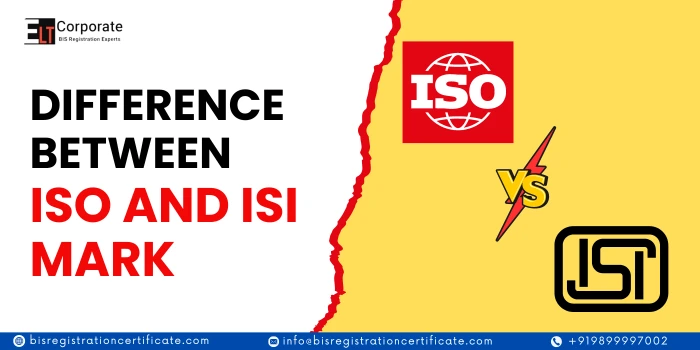This guide will help you understand the difference between ISO and ISI marks and how they impact the products you use daily. Knowing the difference between the Indian Standards Institute (ISI) and the International Organization for Standardization (ISO) is important for making informed product quality and safety choices.
It is important to have a general understanding of ISI and ISO marks. ISO certification indicates high product quality, dependability, and health-related safety, ensuring that goods or services meet consumer needs. On the other hand, ISI is an Indian certification focused on quality control for specific goods or services. This article will explain ISO and ISI in more detail and in simpler terms. So, let’s get started!
What Is ISO Mark?
The International Organization for Standardization Mark (ISO Mark) is an independent, non-governmental international organisation. It develops and publishes standards to ensure the quality, safety, and efficiency of products & services. ISO standards are internationally recognized and are applicable across various industries, including technology, manufacturing, healthcare, and more.
In summary, the ISI mark certifies compliance with Indian standards, while ISO standards serve as international benchmarks applicable across various countries and industries.
Key Points About ISO Mark
Here listed are the key points of the ISO certificate, read here:
- Global Standards: ISO standards are accepted and recognized worldwide.
- Voluntary: Obtaining ISO certification is usually voluntary, though it may be required by certain clients or industries.
- Broad Scope: ISO standards cover various aspects including quality management (ISO 9001), environmental management (ISO 14001), information security (ISO 27001), and more.
- Certification Process: To get ISO certified, organizations must undergo a rigorous audit process conducted by an authorized certification body. This process involves documenting procedures, implementing standards, and demonstrating compliance through regular audits.
What Is ISI Mark?
The Indian Standards Institute Mark (ISI mark) is a certification mark which is provided by the Bureau of Indian Standards (BIS). The ISI mark ensures that a product conforms to the standards set by BIS regarding quality, safety, and performance.
Key Points About ISI Mark
- Indian Specific: The ISI mark is specific to products manufactured or sold in India.
- Mandatory Products: For certain products, such as electrical appliances and cement, obtaining an ISI mark is mandatory to ensure safety and quality.
- Product Focused: The ISI mark focuses on the product’s quality and safety standards.
- Product Specific: Unlike ISO, which can apply to systems and processes, the ISI mark is specific to individual products.
- Certification Process: Manufacturers must apply for the ISI mark, and BIS-approved laboratories test their products. If the products meet the required standards, they are granted the ISI mark.
Also Read: Get BIS License For Importers
What Is The Difference Between ISO and ISI Mark?
Here is a comparison of ISO and ISI certification in a table format to highlight their differences more clearly:
| Feature | ISO Mark | ISI Mark |
|---|---|---|
| Scope and Recognition | Global | National (India) |
| Voluntary vs. Mandatory | Usually voluntary but may be required by certain clients or industries | Mandatory for certain products in India |
| Certification Body | Various accredited bodies worldwide | Bureau of Indian Standards (BIS) |
| Application | Management systems, processes, and services | Specific to individual products |
| Standards Development | Developed through global consensus involving international experts | Developed by BIS based on national requirements |
| Focus Area | Quality management, environmental management, information security, and more | Product quality and safety |
| Industry Coverage | A wide range of industries | Specific to certain products such as electrical appliances, cement, etc. |
| Testing and Certification | Organizations undergo rigorous audits by certification bodies | Products are tested by BIS-approved laboratories |
| Examples of Standards | ISO 9001 (Quality Management), ISO 14001 (Environmental Management), ISO 27001 (Information Security) | ISI mark for electrical appliances, cement, and other consumer goods |
Pros And Cons Of ISI and ISO Mark [Comparison Table]
Here’s an in-depth comparison table to understand the advantages and disadvantages of ISO mark and ISI certification. Continue reading to make informed decisions regarding product quality and safety.
| Aspect | ISO | ISI |
|---|---|---|
| Global Recognition | ✅ | ❌ |
| National Recognition (India) | ❌ | ✅ |
| Broad Applicability | ✅ | ❌ |
| Product-Specific Standards | ❌ | ✅ |
| Improved Efficiency | ✅ | ❌ |
| Ensures Product Safety | ✅ | ✅ |
| Customer Confidence | ✅ | ✅ |
| Market Access | ✅ | ✅ |
| Encourages Continual Improvement | ✅ | ✅ |
| Mandatory for Certain Products | ❌ | ✅ |
| High Cost | ✅ | ✅ |
| Complex Certification Process | ✅ | ✅ |
| Regular Audits and Maintenance | ✅ | ✅ |
| International Trade Facilitation | ✅ | ❌ |
| Specific to the Indian Market | ❌ | ✅ |
What Is The Difference Between ISO And ISI Certificates?
The ISO certificate is given by an international body and ensures that products and services meet global quality and safety standards. On the other hand, the ISI certificate, issued by the BIS, ensures that products meet India’s specific safety and quality standards. Essentially, ISO is for international standards, while ISI is for Indian standards.
What Is ISO And ISI In Production Management?
The ISI mark is a certification specific to India, indicating compliance with Indian standards, while ISO standards are international benchmarks applicable across various countries and industries. The ISI mark is issued by the Bureau of Indian Standards (BIS) in India.
Although, both organizations play crucial roles in standardizing and improving production processes.
What Is The Difference Between ISO And BIS?
ISO is an international body that creates global standards for various industries, while BIS is a national organization that sets standards for industries within India.
What Is The Full Form Of ISO?
The full form of ISO is the International Organization for Standardization. ISO creates standards and guidelines for various industries and publishes technical reports.
Why Is ISO Required?
ISO is required to ensure high quality, safety, and efficiency across industries worldwide, facilitating international trade and improving consumer confidence.









